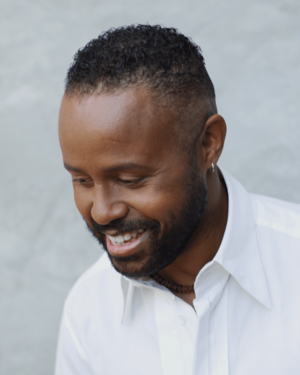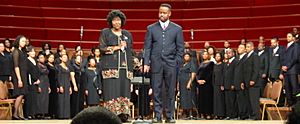Mervyn Warren facts for kids
Quick facts for kids
Mervyn Warren
|
|
|---|---|
 |
|
| Background information | |
| Birth name | Mervyn Edwin Warren |
| Born | February 29, 1964 Huntsville, Alabama, U.S. |
| Genres | |
| Years active | 1973-present |
| Labels |
|
| Associated acts |
|
Mervyn Edwin Warren (born February 29, 1964) is an American musician with many talents. He is a film composer, record producer, conductor, arranger, songwriter, pianist, and singer. For his amazing work, he has won five Grammy Awards and has been nominated ten times.
Warren has created music for many popular movies and TV shows. He has also worked with famous producers like Quincy Jones and David Foster. He has arranged music for dozens of famous artists, including Whitney Houston and Boyz II Men.
He is best known as one of the original members of the singing group Take 6. He also composed the music for the hit movie The Wedding Planner and produced songs for Sister Act 2. Warren was also a key producer and arranger for the soundtrack of the Whitney Houston movie The Preacher's Wife. This soundtrack became the best-selling gospel album of all time.
Contents
Early Life and Musical Beginnings
Mervyn Warren was born on a leap day (February 29) in Huntsville, Alabama. His parents were both professors. His mother taught him to read and do math when he was only three. This allowed him to finish first and second grade in a single year.
Because he was younger than his classmates, he often felt left out. He spent a lot of his time playing the piano, which he started learning at age five. He preferred making up his own music to playing from a book. Growing up, he listened to classical, choral, and Christian music.
At age 10, he started playing piano for a singing group of five girls from his school. Soon, he was creating his own arrangements for them. By age 12, he was writing his own original songs for the group to perform.
When he was 15, he attended a special summer program for students who were good at math and science. In 1981, he graduated as the top student (valedictorian) from his high school. He then went to Oakwood University, where he earned a degree in music in 1985. He later got a master's degree in arranging from the University of Alabama.
Starting His Music Career
Warren's talent for music was clear from a young age. He was a skilled piano player and often accompanied singers at church and school events. His first professional recording was for a new version of "The Lord's Prayer". He helped arrange the vocals and played keyboards on the track.
While in high school, Warren and his friend Mark Kibble formed a male singing group called Alliance. The group was known for its complex and unique vocal arrangements. They became very popular and performed all over the United States.
In college, Warren joined a famous choir called The Aeolians. He toured with them across the U.S. and even to other countries like England and Scotland. He was so talented that he became the choir's assistant conductor. He even composed a song, "I Ain't Got Long To Be Here," which the choir performed regularly. This was a huge honor for a student.
The Rise of Take 6
In 1987, Warren's group Alliance signed a record deal with Warner Bros. Records. They moved to Nashville, Tennessee, and changed their name to Take 6. The group, which sang a cappella (without instruments), quickly became famous around the world.
Warren produced or co-produced most of their first two albums, Take 6 and So Much 2 Say. He also wrote or arranged many of the songs. With Take 6, he won his first Grammy Awards. The group toured with famous artists like Al Jarreau and performed at famous places like Carnegie Hall.
Take 6 also worked with many other stars. They sang on Quincy Jones's album Back on the Block and on the Don Henley album The End of the Innocence. They also recorded the song "Don't Shoot Me" for the Spike Lee movie Do the Right Thing.
In 1991, Warren decided to leave Take 6. He wanted to focus on his career as a producer, songwriter, and film composer.
A Career in Film and Music Production
After leaving Take 6, Warren's career continued to grow. One of his most famous projects was Handel's Messiah: A Soulful Celebration in 1991. For this album, he took the classic music of Handel's Messiah and rearranged it using African-American music styles like blues, gospel, and jazz. The album was a huge success and won a Grammy Award.
In 1993, he was asked to work on the movie Sister Act 2: Back in the Habit. This job brought him to Los Angeles, where he has worked ever since. He has composed the background music (called an orchestral score) for many films and TV shows. He has also written and produced songs for top artists.
In 2013, he co-wrote the song "You Have More Friends Than You Know" with Jeff Marx. The song was featured on the TV show Glee and supported the It Gets Better organization, which helps young people.
Awards and Honors
Mervyn Warren's work has earned him many awards and nominations over the years.
Grammy Awards and nominations
| Year | Category | Title | Genre | Result |
|---|---|---|---|---|
| 1997 | Best R&B Album | The Preacher's Wife Soundtrack—Whitney Houston | Various | Nominee |
| 1994 | Best Instrumental Arrangement Accompanying Vocals | "Ability to Swing"—Patti Austin | Jazz | Nominee |
| 1992 | Best Contemporary Soul Gospel Album | Handel's Messiah: A Soulful Celebration | Various | Winner |
| 1992 | Best Instrumental Arrangement Accompanying Vocals | "Why Do the Nations So Furiously Rage?"—Al Jarreau | Jazz | Nominee |
| 1990 | Best Contemporary Soul Gospel Album | So Much 2 Say – Take 6 | Jazz/Gospel | Winner |
| 1990 | Best Instrumental Arrangement Accompanying Vocals | "Come Sunday"—Donna McElroy | Jazz | Nominee |
| 1989 | Best Gospel Performance by a Duo, Group, or Chorus | "The Savior Is Waiting"—Take 6 | Jazz/Gospel | Winner |
| 1988 | Best Jazz Vocal Performance by a Duo or Group | "Spread Love"—Take 6 | Jazz | Winner |
| 1988 | Best Soul Gospel Performance by a Duo, Group, Choir, or Chorus | Take 6 (album)—Take 6 | Jazz/Gospel | Winner |
| 1988 | Best New Artist | Take 6 | Jazz/Gospel | Nominee |
Soul Train Award
| Year | Category | Title | Genre | Result |
|---|---|---|---|---|
| 1989 | Best Gospel Album | Take 6 | Jazz/Gospel | Winner |
NAACP Image Award nominations
| Year | Category | Title | Genre | Result |
|---|---|---|---|---|
| 1993 | Outstanding Gospel Artist | Various Artists, Handel's Messiah: A Soulful Celebration | Various | Nominee |
| 1988 | Outstanding Gospel Artist | Take 6 | Jazz/Gospel | Nominee |
Dove Awards and nominations (10)
| Year | Category | Title | Genre | Result |
|---|---|---|---|---|
| 2008 | Contemporary Gospel Recorded Song of the Year | "Be the Miracle" • Evan Almighty Soundtrack (Room for Two) | Pop/Gospel | Nominee |
| 1992 | Contemporary Black Gospel Album of the Year | Handel's Messiah: A Soulful Celebration (Various Artists) | Various | Winner |
| 1990 | Contemporary Black Gospel Album of the Year | So Much 2 Say (Take 6) | Jazz/Gospel | Winner |
| 1990 | Contemporary Black Gospel Song of the Year | "I L-O-V-E U" (Take 6) | R&B/Gospel | Winner |
| 1990 | Song of the Year | "I L-O-V-E U" | R&B/Gospel | Nominee |
| 1990 | Group of the Year | Take 6 | Jazz/Gospel | Nominee |
| 1990 | Traditional Black Gospel Song of the Year | "Something Within Me" (Take 6) | Gospel | Nominee |
| 1988 | Group of the Year | Take 6 | Jazz/Gospel | Winner |
| 1988 | Contemporary Black Gospel Album of the Year | Take 6 (Take 6) | Jazz/Gospel | Winner |
| 1988 | Contemporary Black Gospel Song of the Year | "If We Ever" (Take 6) | Jazz/Gospel | Winner |
Stellar Awards
| Year | Category | Title | Genre | Result |
|---|---|---|---|---|
| 1988 | Best New Artist | Take 6 | Jazz/Gospel | Winner |
| 1988 | Best Performance by a Duo or Group, Contemporary | Take 6 | Jazz/Gospel | Winner |
 | Aaron Henry |
 | T. R. M. Howard |
 | Jesse Jackson |


